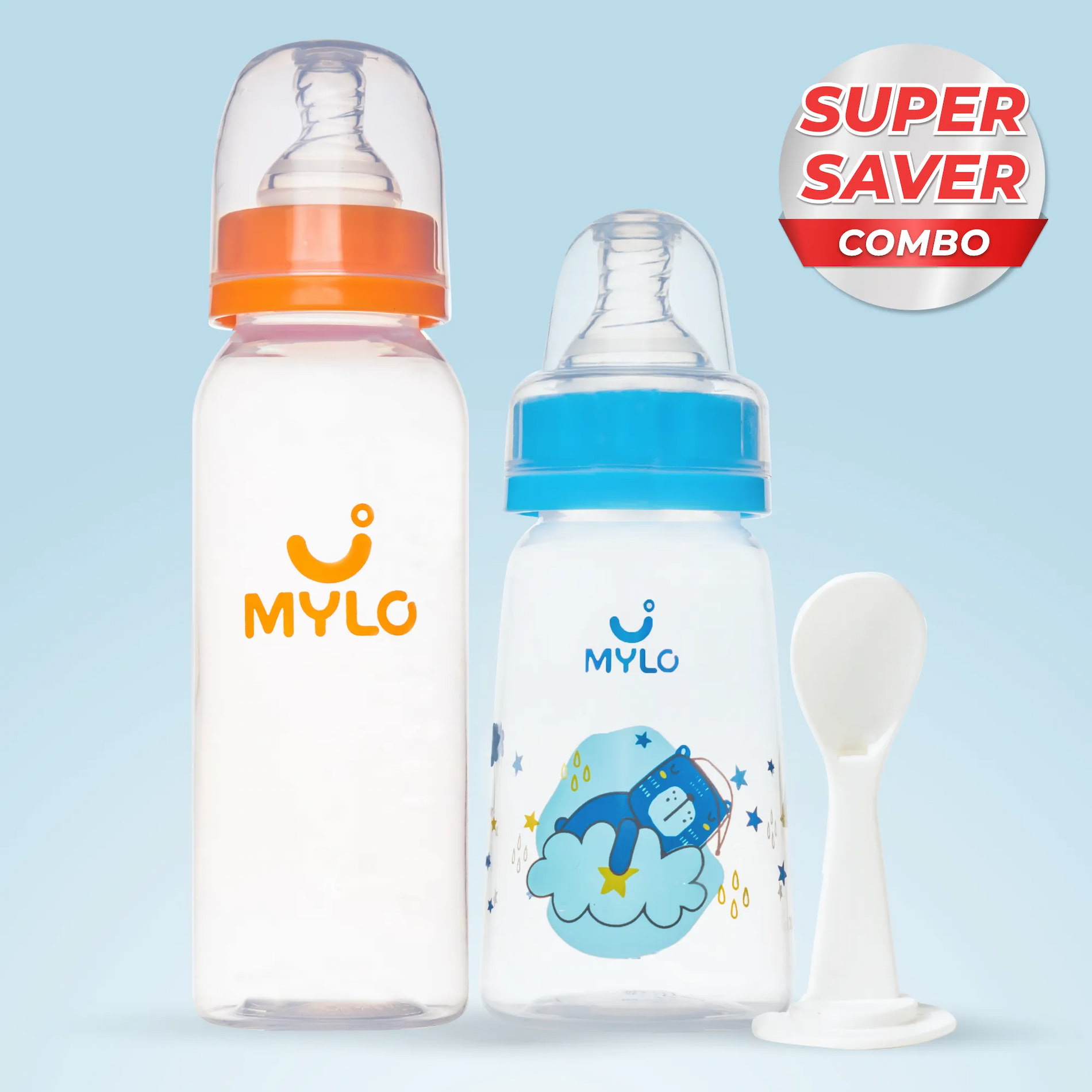Home

Formula Milk vs Cow Milk: Pros and Cons for Your Baby's Growth
In this Article

Feeding from a Bottle
Formula Milk vs Cow Milk: Pros and Cons for Your Baby's Growth
Updated on 13 June 2023
As a new parent, one of the biggest decisions you will have to make is deciding between formula milk vs cow milk for your baby's growth. While cow milk is a natural choice, formula milk has become increasingly popular in recent times. But which one is better for your baby?
In this article, we will discuss the nutritional differences between formula milk and cow milk, their respective benefits and disadvantages, and how to choose the right milk for your baby's growth.
What is Formula Milk and Cow Milk?
Formula milk is a commercially prepared substitute for breast milk. It is made from a combination of ingredients such as cow's milk, vegetable oils, and added vitamins and minerals. Formula milk is available in various forms such as powder, liquid concentrate, and ready-to-use.
On the other hand, cow milk is a natural source of nutrition for human beings. It contains a combination of proteins, fats, carbohydrates, vitamins, and minerals that are essential for a baby's growth.
Formula Milk vs Cow Milk: Nutritional Differences
The nutritional content of formula milk and cow milk is different. Formula milk is designed to mimic the nutritional profile of breast milk. It contains a combination of proteins, fats, carbohydrates, vitamins, and minerals that are essential for a baby's growth. Additionally, formula milk is fortified with nutrients such as iron, calcium, and vitamin D, which are not present in sufficient quantities in cow milk.
Cow milk, on the other hand, contains a higher proportion of proteins and minerals such as calcium and phosphorus, but a lower proportion of fats and carbohydrates.
Benefits of Formula Milk
Formula milk has several benefits for babies such as:
1. Convenient option
Firstly, it is a convenient option for mothers who are unable to breastfeed or prefer not to. Formula milk is readily available and can be easily prepared, making it a convenient option for working mothers.
2. Fortified with nutrients
Additionally, formula milk is fortified with essential nutrients such as iron and vitamin D, which are important for a baby's growth and development.
3. Longer shelf life
Formula milk also has a longer shelf life than breast milk, making it a useful option for busy parents.
Disadvantages of Formula Milk
While formula milk has its benefits, it also has some disadvantages including:
1. Slower digestion
Infant formulas take two times longer for a baby to digest than breast milk, which can affect feeding frequency.
2. Cost
Formula feeding can be expensive, especially if the baby requires a special type of formula, which can put a financial strain on families.
3. Missed health benefits
Women who feed their children formula miss the health benefits of breastfeeding, such as a lower risk of heart disease, type 2 diabetes, and breast cancer
4. Side effects
Formula milk can have side effects such as constipation, diarrhea, and allergies. It is important to consult a pediatrician if any of these symptoms occur.
Benefits of Cow Milk
Cow milk has several benefits for babies such as:
1. Natural source
Cow milk is a natural source of nutrition for human beings. It contains a combination of proteins, fats, carbohydrates, vitamins, and minerals that are essential for a baby's growth.
2. Economical
Cow milk is a cheaper option compared to formula milk, especially if you have a steady supply of fresh milk.
3. Rich in proteins and minerals
Cow milk also contains a higher proportion of proteins and minerals such as calcium and phosphorus, which are important for a baby's growth and development.
Disadvantages of Cow Milk
While cow milk has its benefits, it also has some disadvantages.
Firstly, cow milk is not suitable for babies under the age of one. Giving cow milk before 1 year can lead to serious consequences such as diarrhea, vomiting, intestinal bleeding etc.
1. Hard to digest
Cow milk is difficult for babies to digest and may cause digestive issues such as constipation, gas, and diarrhea.
2. Low nutritional content
Cow milk is not fortified with essential nutrients such as iron and vitamin D, which are important for a baby's growth and development. Cow milk may also contain hormones and antibiotics that may not be suitable for some babies.
Should You Give Formula Milk or Cow Milk After 1 Year?
After the age of one, babies can be introduced to cow milk as a source of nutrition. However, it is important to note that cow milk should not be given as a substitute for breast milk or formula milk before the age of one.
Cow milk should be introduced slowly and in small quantities to ensure that your baby can tolerate it. Additionally, it is important to ensure that your baby is getting all the essential nutrients that are present in breast milk or formula milk.
You may also like: When Is the Best Time to Give Your Child Cow’s Milk and How to Make the Switch Easier?
How to Choose the Right Milk for Your Baby - Formula Milk vs Cow Milk
Choosing the right milk for your baby can be a daunting task. The decision ultimately depends on your baby's individual needs and your personal preferences. If you are unable to breastfeed or prefer not to, formula milk may be a suitable option. It is important to choose a formula milk that is age-appropriate and meets your baby's nutritional needs.
If you have a steady supply of fresh milk, cow milk may be a cheaper option. However, it is important to ensure that your baby is getting all the essential nutrients that are present in breast milk or formula milk.
You may like: The Ultimate Guide to Formula Milk: Everything You Need to Know
How to Transition from Formula Milk to Cow Milk?
Transitioning from formula milk to cow milk can be a gradual process. Here are some points you should keep in mind:
- It is important to introduce cow milk slowly and in small quantities to ensure that your baby can tolerate it.
- You can start by mixing cow milk with formula milk in a 1:3 ratio and gradually increasing the proportion of cow milk over a period of two weeks.
- Additionally, it is important to ensure that your baby is getting all the essential nutrients that are present in breast milk or formula milk.
Closing Thoughts
Choosing between formula milk vs cow milk can be a difficult decision for new parents. While both options have their respective benefits and disadvantages, the decision ultimately depends on your baby's individual needs and your personal preferences. Consult with your pediatrician to make an informed decision that is best for your baby's growth.
References
1. Ehrlich JM, Catania J, Zaman M; et al. (2022). The Effect of Consumption of Animal Milk Compared to Infant Formula for Non-Breastfed/Mixed-Fed Infants 6-11 Months of Age: A Systematic Review and Meta-Analysis. Nutrients.
2. Udall JN Jr, Suskind RM. (1999). Cow's milk versus formula in older infants: consequences for human nutrition. Acta Paediatr Suppl.

2-in-1 Baby Feeding Bottle - Bear & Orange 125ml & 250ml (Pack of 2)
BPA Free with Anti-Colic Nipple & Spoon | Easy Flow Neck Design
₹ 281

4.3
(8754)


250 Users bought



Written by
Anupama Chadha
Anupama Chadha, born and raised in Delhi is a content writer who has written extensively for industries such as HR, Healthcare, Finance, Retail and Tech.
Read MoreGet baby's diet chart, and growth tips

Related Articles
Why Protein Is Essential During Pregnancy: Benefits of Protein-Rich Snacks
Top 100 Baby Names for Boys and Girls 2026 Edition: The Ultimate Trending & Meaningful Name Guide
The Ultimate Guide to the Best Romantic Web Series on OTT for Couples
Best Indian Crime Web Series Based on True Stories: The Ultimate Binge-Watch Guide (2026)
Related Questions
Influenza and boostrix injection kisiko laga hai kya 8 month pregnancy me and q lagta hai ye plz reply me

Hai.... My last period was in feb 24. I tested in 40 th day morning 3:30 .. That is faint line .. I conculed mylo thz app also.... And I asked tha dr wait for 3 to 5 days ... Im also waiting ... Then I test today 4:15 test is sooooo faint ... And I feel in ma body no pregnancy symptoms. What can I do .

Baby kicks KB Marta hai Plz tell mi

PCOD kya hota hai

How to detect pcos

Related Topics
RECENTLY PUBLISHED ARTICLES
our most recent articles

Medical Procedures
Orchidopexy: All You Need to Know About Its Procedure, Risks, and Recovery

Reproductive health
Transvaginal Ultrasound: A Non-Invasive Tool for Early Detection of Reproductive Health Issues

Diet & Nutrition
New Mom Diet Plan – Month 11 Week 42

Male Infertility
Ejaculatory Duct Obstruction: How It Affects Male Fertility and What You Can Do About It

Testicular Ultrasound: What You Need to Know About the Procedure and Its Benefits

Symptoms of Low AMH to Watch Out For: A Health Alert for Women Trying to Conceive
- Hysteroscopy: Everything You Need to Know About This Minimally Invasive Procedure
- Dalchini: How This Herb Can Make Way From Your Spice Rack to Your Medicine Cabinet
- Fenugreek Powder: Health Benefits of Fenugreek From Your Kitchen to Your Medicine Cabinet
- Moringa Powder: The Superfood You Need in Your Diet for a Healthy Lifestyle
- Genital Herpes: Causes, Symptoms, Risks & Treatment
- Ashokarishta: All You Need to Know About This Miracle Tonic for Women
- 10 Amazon Prime Movies to Look Forward to in 2023
- 10 Best Netflix Movies to Watch Out For in 2023
- Fertility Yoga: A Natural Solution to Boost Your Chances of Conception
- How to Get Regular Periods Naturally: Ayurvedic Herbs, Lifestyle Changes & Homeopathy
- Lodhra: The Wonder Herb for Women's Health
- Malabsorption Syndrome: Types, Causes, Symptoms, & Treatment
- Top 10 Short Bedtime Stories for Kids
- RH Incompatibility in Pregnancy - Causes, Symptoms & Treatments


AWARDS AND RECOGNITION

Mylo wins Forbes D2C Disruptor award

Mylo wins The Economic Times Promising Brands 2022
AS SEEN IN

- Mylo Care: Effective and science-backed personal care and wellness solutions for a joyful you.
- Mylo Baby: Science-backed, gentle and effective personal care & hygiene range for your little one.
- Mylo Community: Trusted and empathetic community of 10mn+ parents and experts.
Product Categories
baby carrier | baby soap | baby wipes | stretch marks cream | baby cream | baby shampoo | baby massage oil | baby hair oil | stretch marks oil | baby body wash | baby powder | baby lotion | diaper rash cream | newborn diapers | teether | baby kajal | baby diapers | cloth diapers |




